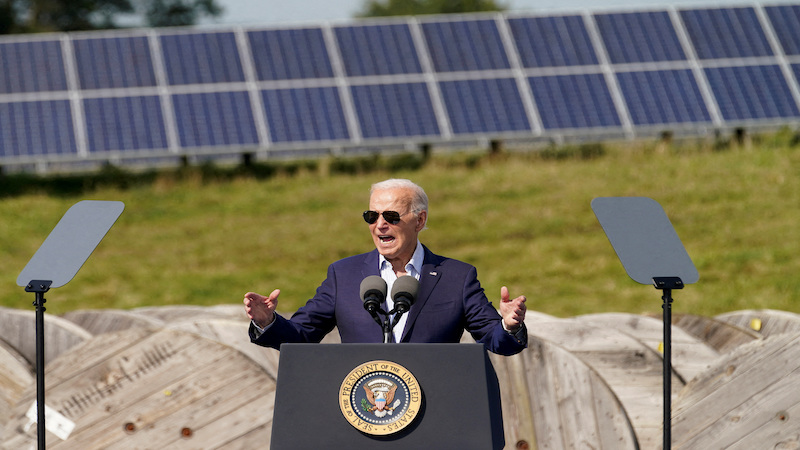President Joe Biden has announced a US target to cut greenhouse gas emissions by 61-66% below 2005 levels by 2035, with White House officials saying the new goal can be achieved even if climate-change sceptic Donald Trump tries to roll back the country’s climate-action agenda.
With just a month to go until President-elect Trump takes office, the outgoing administration called its updated Nationally Determined Contribution (NDC) under the Paris Agreement “ambitious and achievable” thanks to federal investments made in the last four years under Biden, including through the Inflation Reduction Act, and policies introduced at state level.
Donald Trump has indicated he may pull the US out of the Paris Agreement again – something he did during his previous term in the White House – and is likely to undo many green policies and encourage more fossil fuel production.
But John Podesta, senior advisor to Biden for international climate policy, told journalists that the “investments under this administration are durable and will continue to pay dividends for our economy and our climate for years to come”.
That is because the strategy has been led by the private sector, which has announced over $450 billion in clean energy investments, he added on a call before the new target was unveiled on Thursday.
“While the United States federal government under President Trump may put climate action on the back burner, the work to contain climate change is going to continue in the United States with commitment and passion and belief,” he said.
The United Nations has asked all countries to submit more ambitious national climate plans by February next year, including 2035 emissions-cutting targets, in an effort to put the world on track to limit global warming to 1.5 degrees Celsius as governments agreed to do under the 2015 Paris pact.
State leaders step up
Podesta urged local government officials – including governors and mayors – as well as business leaders to carry climate action forward and “show how many Americans still care about the future of our planet”.
The US is not currently on track to meet its existing goal of slashing greenhouse gas emissions by between 50% and 52% by 2030, according to several independent assessments.
Tell us your top three climate issues for 2025! We’ll share the results in the New Year
Announcing the new NDC, White House climate policy official Ali Zaidi said the 2035 target puts the US on a trajectory to reach net zero by 2050, meaning that the country “will do its part to keep [the Paris Agreement goal of] 1.5 degrees alive”.
Rachel Cleetus, policy director and lead economist for the climate and energy programme at the Union of Concerned Scientists (UCS), said that “while falling short of what the science requires”, the 2035 goal and plan to get there provides “an important benchmark to propel further climate action by cities, states, Tribal nations, and businesses”.
Manish Bapna, president of the Natural Resources Defense Council (NRDC), a US think-tank, said the new emissions-reduction target can “serve as a North Star” for all those actors that are “ready to accelerate progress outside of Washington”.
Twenty-four state governors united under the “US Climate Alliance” pledged on Thursday to work together to achieve the NDC. Lujan Grisham, the Democratic governor of New Mexico and co-chair of the alliance, said “the only thing clearer than the science and impacts of climate change is the benefit of taking action – and we’re not slowing down”.
A recent study by the University of Maryland’s Center for Global Sustainability indicated that the US could reduce emissions by 54-62% by 2035, relying only on “strong” climate action from non-federal actors.
Senior US administration officials said their own analysis of the potential for clean energy technologies to achieve cost-effective emissions cuts backed this up. But one noted “the higher ends of this [2035] range require the federal government to do what a responsible federal government would do in the face of an existential risk and the biggest economic opportunity the world has ever seen to invest in America”.
‘Drill, baby, drill’
The wider NDC document filed with the UN climate change body on Thursday does not contain any concrete plans to reduce fossil fuel production, while only name-checking the global agreement to “transition away from fossil fuels in energy systems” reached at COP28 in Dubai last year.
In 2023, the US was the world’s largest producer of crude oil and the biggest exporter of liquefied natural gas (LNG).
After taking office, Donald Trump is expected to spur more oil and gas development.
Karoline Leavitt, a spokeswoman for the Trump transition team, told Fox News this week that Trump would issue executive orders “to drill, baby, drill,” and “to expedite permits for drilling and for fracking all over this country” immediately after his inauguration.
Collin Rees, US campaign manager at Oil Change International, said the Biden administration’s updated climate plan “ignores scientists’ clear warning that halting new fossil fuel projects is essential to keep warming below 1.5C”.
“Biden is squandering his last chance to lock in ambitious commitments to stop the massive growth of oil and gas production,” Rees added, while also calling on Biden to take measures including the rejection of pending LNG exports in his final weeks in office.
Earlier this week, the US government released a long-awaited study on the impact of its LNG exports, highlighting that further expansion would increase costs for domestic consumers and hamper efforts to curtail the climate crisis.
The United Arab Emirates and Brazil – among the handful of countries that have announced new NDCs this year – also left out any commitment to cut their oil and gas output, while Canada and the UK have both set a 2035 target but not yet outlined plans to reach the goal. Britain’s Labour government, which took power in July, has ruled out issuing new oil and gas licences for the North Sea.
After Baku setback, activists call for ‘just transition’ to be front and centre at COP30
Ashfaq Khalfan, climate justice director at Oxfam America, said the new US NDC “ignores critical targets for phasing out fossil fuel production and fails to commit funds to help disadvantaged communities in the Global South”.
It “represents the bare minimum floor for climate action”, he added.
The article was updated on 19/12 after publication to add comments received from Oil Change International.
(Reporting by Matteo Civillini; editing by Megan Rowling)

